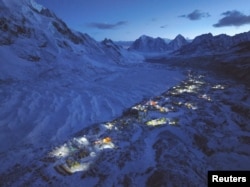The only living member of the team to first climb to the top of Mount Everest says the mountain is too crowded and polluted.
Ninety-one-year-old Kanchha Sherpa was part of the team that helped New Zealander Edmund Hillary and Nepali Sherpa Tenzing Norgay reach the peak of the world’s tallest mountain on May 29, 1953.
Kanchha recently spoke with the Associated Press, saying the 8,849-meter tall mountain must be respected. “They should not be dirtying the mountain. It is our biggest god and they should not be dirtying the gods,” he said.
Since 1953, the mountain has been climbed thousands of times, and it gets more crowded every year.
During the spring climbing season in 2023, 667 climbers got to the top, or summit. And that brought thousands of support workers to Everest base camp between March and May.
“It would be better for the mountain to reduce the number of climbers,” Kanchha said. “Right now there is always a big crowd of people at the summit.”
There have been concerns for years about the number of people living on the mountain for several months and leaving trash behind. But officials have no plans to cut down on the number of permits they issue to climbers.
The rules require climbers to bring down their own trash, equipment and everything they carry to the mountain. But monitoring of the climbers has not been very effective.
“It is very dirty now. People throw tins and wrappings after eating food. Who is going to pick them up now?” Kanchha said.
Some climbers just drop their trash in deep openings in the earth on the mountain, he said, noting that the trash is hidden at first. But, he said, in time the trash “will flow down to base camp as the snow melts and carries them downward.”
For the Sherpas, Everest is Qomolangma or goddess mother of the world. The mountain is highly honored. And Sherpas generally perform religious services before climbing it.
Kanchha was just a young man when he joined the Hillary-Tenzing climb. He was among the three Sherpas to set up the climb’s last camp for Hillary and Tenzing to use.
They heard by radio message that Hillary and Norgay reached the top. Later, the summiteers reunited with the Sherpas at Camp 2.
“We all gathered at Camp 2 but there was no alcohol so we celebrated with tea and snacks,” Kanchha said. “We then collected whatever we could and carried it to base camp.”
The path they opened up from the base camp to the summit is still used by current climbers.
I’m Caty Weaver.
The Associated Press reported this story. Caty Weaver adapted it for VOA Learning English.
________________________________________________
Words in This Story
peak – n. mountain top
trash – n. things that are no longer useful or wanted and that have been thrown away
monitor – v. to watch, keep track of, or check usually for a special purpose
tins – n. metal containers
wrapping – n. paper or soft material used to cover or enclose something.
snack – n. a light meal; food eaten between usual mealtimes








Forum